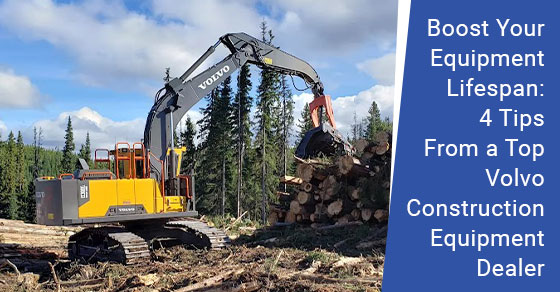
Boost Your Equipment Lifespan: 4 Tips From a Top Volvo Construction Equipment Dealer

After spending tens of thousands of dollars on new construction equipment, the last thing you want is to have to replace that equipment after only a few years of use.
While a big component in determining the lifespan of your heavy equipment is its quality, there are several other factors that play a part, including how you treat that equipment throughout its lifetime.
How frequently and thoroughly you maintain a piece of equipment, how often you use it, the skill of its operators, and the types of environments it is used in can all impact its lifespan either positively or negatively.
Not only will mishandling your heavy equipment and neglecting to properly care for it reduce its lifespan, ultimately costing significant financial losses, but this will also have a negative effect on its performance.
In order to maximize the lifespan of your equipment and achieve optimal performance, putting the right amount of time and effort into regular maintenance is essential.
Best Ways to Boost the Lifespan of Your Heavy Equipment
Even the sturdiest and most well-built construction equipment will run into issues and have frequent breakdowns if it is not properly cared for. This equipment will lose years from its lifespan if treated in such a manner.
On the other hand, there are certain practices and strategies to add years to the lifespans of your construction equipment. Making these practices part of your regular routine will afford you a much better return on your investment:
1. Perform daily pre-start checks
It is always better to find an issue during an equipment inspection rather than learn of it while operating the machine. Thus, it is critical to perform a thorough check of your equipment each morning before putting it to work. Inspecting both your machine and the ground it has been parked in search of signs of damage or a leak is a good daily practice.
This inspection should include a tire pressure check to mitigate unnecessary wear and tear so that you can facilitate fewer tire changes. It also helps to examine the cleanliness of the air filtration system, fan belt wear and tension, and the machine’s engine oil and coolant levels. If your machine has undercarriage, checking your track sag on a daily basis can also help mitigate bigger maintenance costs down the road. All of these checks will prevent serious damage to your machine.
If you find any issues while performing these regular checks, ensure they are dealt with promptly to avoid having them escalate, leading to costly repairs.
2. Always warm up and cool down your machines
Another good routine practice is warming up your equipment before you begin using it by starting the engine and letting it run at low idling for about half a minute first.
If you are using the equipment in very cold weather, you may want to extend this idling period longer, as it will take more time for your machine to sufficiently heat up. However, warm-up times can be reduced if your machine is equipped with an electrical heater. Once your machine reaches its suggested operating temperature, you are good to go.
Having a cool-down routine is equally as important, and should begin with the operator ensuring the machine is parked on level ground and the parking brake is activated.
Before shutting the machine down completely, allow the engine to idle again for a few minutes. If possible, it is best to perform this process in a shady area as this will facilitate a more gradual cool down.
3. Use the right oils
Another crucial factor that can impact the lifespan of heavy equipment is using the proper oil. When you use oils specifically formulated for a particular machine, it will boost the efficiency of your equipment while also lowering the chance of issues arising. In turn, this will ultimately lead to a longer lifespan.
It is best to use OEM filters and lubricants, since these oils are able to handle a complete work cycle, from light duty all the way up to heavy duty.
4. Invest in active machine monitoring and reporting
Sometimes, it may not always be easy for an operator to know when a machine is experiencing an issue. Certain problems are not obvious and may only be indicated by particular error codes.
However, if you have a telematics program in place, such problems will always be caught so that they can be dealt with promptly before they escalate. With active monitoring and reporting, your equipment will be monitored 24/7. Thus, when a critical issue arises, both you and your dealer will be notified so that appropriate measures can be taken.
How to Find Strong, Reliable, and Durable Heavy Equipment From Nors Equipment
While following all the tips mentioned above will certainly boost the lifespan of your heavy machinery, buying strong and durable equipment from a reliable brand, like Volvo, in the first place will also make a huge difference. As a dependable Volvo construction equipment dealer, Nors Equipment can help you with that.
Whether you are in heavy or civil construction, recycling, waste management, mining, or forestry, we have a wide range of heavy equipment solutions that can meet and exceed your needs. We carry equipment of all types and sizes, and have an extensive stock of both new and used machines.
Our team of top-notch technicians is also equipped to prepare the highest level of aftermarket support. So, if you ever run into issues or need assistance with maintenance or repairs, we have the expertise to assist you every step of the way. With access to the latest technological advancements, we can increase your uptime and lower your operating costs.
For more information about why we are the best Volvo construction equipment dealer, or to learn more about the Volvo equipment that we carry in stock, call Nors Equipment at 1-833-730-0613 or contact us here.



